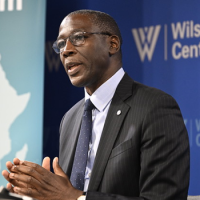Impact of Low Oil Prices: Petro Power or Petro Poverty?
- Lower oil prices, although beneficial to consumers, are proving to be a fiscal and political catastrophe for oil-exporting countries, many of which have predicated their budgets on oil sales remaining around $100 dollars per barrel.
- As Venezuela and other petrostates readjust their budgets and reduce the amount of discounted oil sold to friendly countries, there is an opportunity for new oil exporters, such as the United States, to expand their own markets and build new energy ties.
- This is a rare opportunity to rewrite global energy policies. With many petrostates struggling to cope with lowered oil prices, there is a growing consensus for OPEC to introduce an energy price floor and create some stability in the global energy market.
As the human population continues to grow and modernize around the globe, it seems logical to assume that the demand for energy – particularly hydrocarbons– would steadily increase, global supplies would dwindle, and prices would steadily rise. However, the opposite is currently happening. After years of rising gasoline prices, the average price in the U.S. has suddenly dropped to approximately $3 per gallon. While decreasing energy prices may serve as a type of economic stimulus for high energy consuming countries, such as the U.S., this trend will put a squeeze on many of the world’s leading oil producers – sometimes referred to “petrostates.” The economic stability, and prosperity, of those producers is largely tied to their energy exports.
Although Dr Jan Kalicki called it a “fool’s errand” to make long-term predictions regarding oil prices, Goldman Sachs and other leading economic institutions have forecast oil prices to remain low well into 2015. In the face of economic and potentially political upheaval, petrostates around the world are adjusting their energy policies, cutting spending, and preparing for what could be a prolonged and destabilizing crisis.
Even in a country such as Nigeria – which is not even one of the world’s top 20 oil producers per capita – a fall in oil prices can have large repercussions. As Dr. Raymond Gilpin explained, although Nigeria might not be a top oil producer, it is a “resource driven country,” and energy investments and exports serve as a key driver for the country’s domestic economy. Although the country is still producing more than 2 million barrels per day (BPD), many of its wells are past their peak and need to be replaced and modernized. Dr. Gilpin is now worried that, should oil prices continue to remain low, companies will be reluctant to invest in Nigeria’s infrastructure. This in turn will cause production to slowly decline, exports will drop, and, lacking revenues, the government will need to increasingly tap into its rapidly declining reserve funds. Valued at $9 billion dollars just a few years ago, they now rest at $3 billion dollars.
In Venezuela, the decline in oil prices is already having a very real and destabilizing impact on the country’s political and economic landscape. With oil making up 96% of the country’s exports, a change in price can, in the words of Ms. Risa Targon, either “make or break” the country’s economy. Already drops in oil price have resulted in a scarcity of goods and a series of protests against President Nicolás Maduro. Despite being elected in 2013 with over 50% in approval ratings, has already seen his popularity drop to 30% - primarily due to the country’s economic woes. President Maduro is currently facing protests and, although these protests are largely made up of members of the opposition party, this could change. With the economy set to contract between 3-4% this year, inflation rapidly rising, and scarcity straining government resources, Ms. Targon warned that the government will soon need to make tough decisions regarding its debt obligations and its domestic spending obligations. Should prices continue to drop, and the economy continues to suffer, the potential for “political crisis, and even regime change” grows.
In Russia, Vladimir Putin has been riding a recent wave of political support, however, Dr. Will Pomeranz argues that even President Putin’s hold on power has been put in jeopardy by declining energy prices. Although the country had a large reserve fund at the beginning of the year – totaling $500 billion dollars – 13% of that money has already been spent, and that demand is expected to increase as President Putin has pledged to increase the military budget and social spending, and also redirect supplies to Russia’s newly annexed territory, Crimea.
These pledges however were made on the assumption that oil prices would remain at or above $100 per barrel. Now, with its previous budget proven to be obsolete, the country’s Minister of Finance is proposing to cut government spending by 10% across the board. When combined with preexisting Western sanctions, the government will be increasingly pressed to prop up its domestic economy, further driving up inflation and hurting domestic purchasing power.
Lacking a diverse economy, Dr. Pomeranz argues that Russia, and particularly President Putin, are facing “a self made crisis.” Due to sanctions, the country and its leading companies cannot procure loans and additional money from the West. Further, Dr. Pomeranz argues that, because Putin has so thoroughly dominated Russian politics over the past several years, he will not be able to deflect any blame onto the Russian Parliament nor the Prime Minister. Although the Russian people have been supportive of Putin’s recent policies, their patience and tolerance cannot be relied on should a prolonged crisis strike.
Despite worrisome trends, there is though no clear hope for near-term relief. As the “world’s swing [oil] producer,” Saudi Arabia has the luxury of being able to adjust its oil production in order to help bolster the global market. Already, the country is under producing its oil – churning out 9.6 million BPD rather its maximum rate of 12.5 million BPD – the country could agree to reduce its production even further and help increase global prices. With $750 billion dollars in reserves – enough to cover its annual budget for the next three years – Saudi Arabia could cover the costs. However, Mr. David Ottaway does not believe it is likely to do so. Given its high rate of production, Saudi Arabia can sell its oil for $85 dollars a barrel and still be able to cover its annual budget. Further, by maintaining low prices, the country is able to attract more business and also puts pressure on its regional rival, Iran, to sell at even lower costs and thus further weaken its sanctioned economy.
As leading oil producers around the world prepare for economic hardship, others are seeing potential for new opportunities. In the struggle to keep prices high, Venezuela has reduced the amount of energy it sells through its Petrocaribe oil alliance – made up of the Dominican Republic, Jamaica, and other Caribbean countries. This in turn provides the U.S. with an opportunity to fill the void and begin exporting its own oil throughout the Caribbean. In addition, Dr. Kalicki is hopeful that this potential crisis will serve as a wake up call to oil producing countries and spur members of the Organization of the Petroleum Exporting Countries (OPEC) to renew their offer of a steady steady petroleum price band.
Dr. Kalicki warned, “low oil prices are not here to stay.” He argued for an Energy Security Trust where savings below $3.25 per barrel would be allocated to a unified US electric power grid. Further, as producers and consumers – which are increasingly the same – around the world are united in potential crisis, there is a rare opportunity to establish a new global energy agenda. By promoting coordinated, efficient, and sustainable energy production and consumption, producers and consumers have an opportunity to build up their own domestic prosperity, and to promote growth and development around the world.
Speakers


Former Counselor for International Strategy, Chevron; Chairman, Eurasia Foundation

Former Washington Post Middle East Correspondent


U.S. Economics Editor, The Economist
Hosted By

Kennan Institute
After more than 50 years as a vital part of the Wilson Center legacy, the Kennan Institute has become an independent think tank. You can find the current website for the Kennan Institute at kennaninstitute.org. Please look for future announcements about partnership activities between the Wilson Center and the Kennan Institute at Wilson Center Press Room. The Kennan Institute is the premier US center for advanced research on Eurasia and the oldest and largest regional program at the Woodrow Wilson International Center for Scholars. The Kennan Institute is committed to improving American understanding of Russia, Ukraine, Central Asia, the South Caucasus, and the surrounding region through research and exchange. Read more


Latin America Program
The Wilson Center’s prestigious Latin America Program provides non-partisan expertise to a broad community of decision makers in the United States and Latin America on critical policy issues facing the Hemisphere. The Program provides insightful and actionable research for policymakers, private sector leaders, journalists, and public intellectuals in the United States and Latin America. To bridge the gap between scholarship and policy action, it fosters new inquiry, sponsors high-level public and private meetings among multiple stakeholders, and explores policy options to improve outcomes for citizens throughout the Americas. Drawing on the Wilson Center’s strength as the nation’s key non-partisan policy forum, the Program serves as a trusted source of analysis and a vital point of contact between the worlds of scholarship and action. Read more


Africa Program
The Africa Program works to address the most critical issues facing Africa and US-Africa relations, build mutually beneficial US-Africa relations, and enhance knowledge and understanding about Africa in the United States. The Program achieves its mission through in-depth research and analyses, public discussion, working groups, and briefings that bring together policymakers, practitioners, and subject matter experts to analyze and offer practical options for tackling key challenges in Africa and in US-Africa relations. Read more


Middle East Program
The Wilson Center’s Middle East Program serves as a crucial resource for the policymaking community and beyond, providing analyses and research that helps inform US foreign policymaking, stimulates public debate, and expands knowledge about issues in the wider Middle East and North Africa (MENA) region. Read more


Canada Institute
The mission of the Wilson Center's Canada Institute is to raise the level of knowledge of Canada in the United States, particularly within the Washington, DC policy community. Research projects, initiatives, podcasts, and publications cover contemporary Canada, US-Canadian relations, North American political economy, and Canada's global role as it intersects with US national interests. Read more
